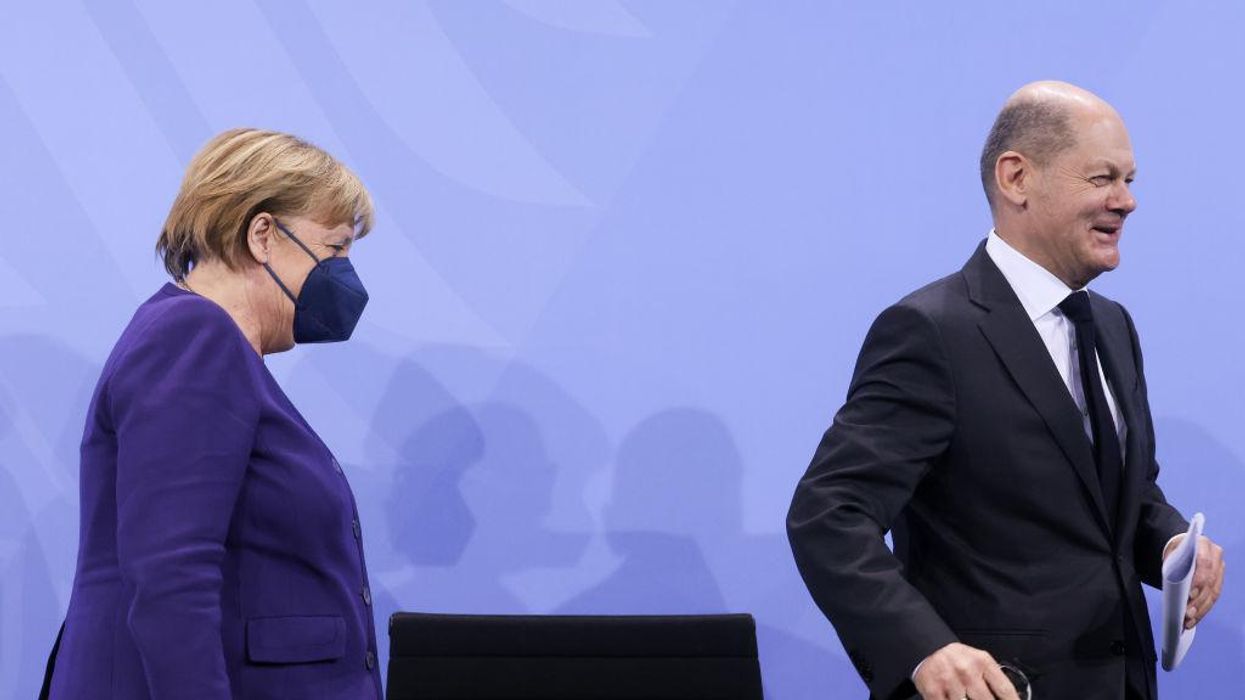
Filip Singer - Pool/Getty Images

Germany will impose sweeping new restrictions against unvaccinated people in response to rising coronavirus cases, authorities said Thursday.
Outgoing Chancellor Angela Merkel and her successor, Olaf Scholz, announced that unvaccinated people will be prohibited from entering public places like theaters, cinemas, and restaurants unless they've recently recovered from COVID-19. Private gatherings that include unvaccinated people who have not recently recovered from the disease will be restricted to one household and a maximum of two individuals from a different household.
“Culture and leisure nationwide will be open only to those who have been vaccinated or recovered,” Merkel said. "We have understood that the situation is very serious and that we want to take further measures in addition to those already taken.”
Large events will also face new restrictions. The number of spectators who attend an indoor event cannot exceed 5,000, while outdoor events will be capped at 10,000 people. Only vaccinated people will be allowed to attend these events, Politico reported Wednesday.
In areas of the country that report more than 350 new infections per 100,000 people over seven days, indoor nightclubs will be forced to close and mask mandates will be put into effect in schools for students of all ages.
Merkel also said that a nationwide vaccine mandate could be imposed in February 2022, once Parliament votes to approve such a measure.
She added that vaccinated people will lose their vaccination status nine months after getting their last shot, in an apparent attempt to force people to take booster shots.
The restrictions come as coronavirus cases are surging in Germany. On Thursday, Germany reported 73,000 new COVID-19 cases and 388 deaths. The day before, health officials reported 67,186 new infections and 446 deaths — the highest number of daily deaths reported in nine months.
Currently, 68.7% of the country's population is fully vaccinated against COVID-19, short of the government's goal of 75%.
Merkel described the new restrictions as an "act of national solidarity" that will "get the infection rate down and take the pressure off our health system."
"The number of infections has stabilized, but on a far too high a level," she said.
Several European countries are adopting vaccine mandates, including Austria and Greece, and the European Union is considering a bloc-wide mandate.
European Union Commission President Ursula von der Leyen said Wednesday the EU should "potentially think about mandatory vaccination" as concerns grow over the Omicron variant discovered in South Africa last week.
"Two or three years ago, I would never have thought to witness what we see right now, that we have this horrible pandemic, we have the vaccines, the life-saving vaccines, but they are not being used adequately everywhere," von der Leyen told reporters.
"How we can encourage and potentially think about mandatory vaccination within the European Union, this needs discussion. This needs a common approach, but it is a discussion that I think has to be led," she added.